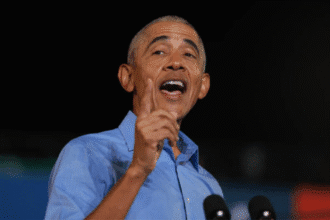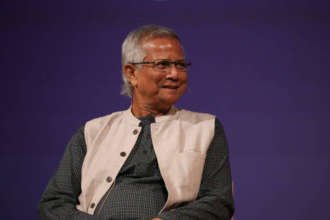In recent months, political and economic tensions between the US and Brazil have grown, leading to the US-Brazil Trade Sanctions. These steps came after legal action was taken against former President Jair Bolsonaro, who is accused of trying to stage a coup to overturn the 2022 presidential election.
Eduardo Bolsonaro, his son and a current Brazilian Congressman, has been a strong supporter of these penalties. He says that they are not just about his father’s legal problems, but also about making Brazil’s democracy more accountable. Eduardo says, “If President Trump starts with tariffs, I do believe that he is right and I do support him because of that,” which shows that he strongly agrees with what the US is doing.
Brazilian goods to the United States are subject to a 50% levy, and numerous Brazilian Supreme Court justices, including Alexandre de Moraes, who is in charge of Bolsonaro’s prosecution, are not allowed to travel. These actions are meant to put pressure on the Brazilian government and show that the US is committed to protecting democratic institutions. In this case, US-Brazil Trade Sanctions are not just a way to punish Brazil; they are also a way to push for changes in Brazil’s government.
How is Eduardo Bolsonaro pushing for the sanctions?
For months, Eduardo Bolsonaro has been in the United States trying to get lawmakers, officials, and think tanks to endorse tougher actions against Brazil’s judiciary. He says that these actions go beyond what is good for him or his family. Eduardo says that the purpose is to show what he calls abuses of power and violations of human rights in Brazil.
He has said that Brazil could face more sanctions if it doesn’t do anything about these problems. Under the Magnitsky Act, these could include more immigration restrictions, financial penalties, and specific actions against certain people. Eduardo says that the US-Brazil Trade Sanctions can lead to systemic changes by drawing attention to certain judicial decisions and officials.
People have said that Eduardo is hurting Brazil’s economy, but he says that freedom and institutional integrity must come before short-term economic concerns. He compares what he’s doing to what activists throughout the world are doing to fight authoritarian governments.
What could the sanctions do to the economy?
The 50% tariffs on Brazilian goods coming into the US are likely to have a lot of effects on the economy. Industries that depend on exports to the US, such as agriculture and industry, would see less demand and higher costs. This might end up hurting consumers, causing layoffs, and making trade between the two countries more difficult.
Still, Eduardo Bolsonaro says that these sanctions are important for long-term political change. He thinks that the short-term economic hardship is worth it if it leads to more open government and institutions that are held accountable.
Polls show that a lot of Brazilians are worried about how the tariffs would affect the economy. Some people support steps to put pressure on the courts, while others are worried about higher prices and less access to imported goods. Eduardo says that the possible benefits of exposing abuses of power and pushing for judicial accountability are greater than the risks.
The US-Brazil Trade Sanctions are meant to do more than only punish people who are thought to have done something wrong. They are also meant to encourage changes that would make Brazil’s democratic processes stronger.
What effect might sanctions have on Brazil’s political future?
The penalties have a big effect on politics. Eduardo Bolsonaro hopes that reforms to Brazil’s electoral court in the future may make it possible for his father to run for office again. He says that separating specific judicial actors is important for changing the system and that the sanctions can help with this by putting pressure on the outside.
The sanctions also send a strong message about how serious the United States is about democratic values and openness. The US-Brazil Trade Sanctions could affect how people vote, how politicians are held accountable, and how institutions as a whole are reformed by showing that judicial overreach and anti-democratic measures can have real-world effects.
The sanctions could potentially change how people throughout the world see Brazil. Global investors and business partners are keeping a careful eye on the issue. Changes that could happen because of outside pressure could affect foreign investment and trade agreements between the two countries. So, the penalties can be used to gain power both at home and abroad.
What are the legal and human rights effects?
Eduardo Bolsonaro often talks about his lobbying work as a way to protect human rights and democratic liberties. He says that his situation is similar to that of activists in countries with oppressive governments, and that it is important to expose wrongdoings even if it means putting his safety in danger.
Eduardo is worried about going back to Brazil since he might face legal problems, even though there is no arrest warrant out for him. He said that the US-Brazil Trade Sanctions protect campaigners for democracy and make sure that the courts are held accountable when the justice system in Brazil fails to perform its job.
Some people say that penalties could hurt Brazil’s sovereignty and make relations between countries worse. But supporters say that targeted sanctions, which focus on certain people and behaviors, can help bring about structural change without hurting the whole population.
What Should Stakeholders Do Now?
Brazilian enterprises, civil society groups, and government officials need to think carefully about what US-Brazil Trade Sanctions mean for them. To keep political goals while reducing economic disruption, it is important to plan well, communicate clearly, and work with foreign partners.
It is important to keep an eye on changes in the law and politics. Stakeholders should expect changes in regulations, how the market will react, and how diplomacy will be affected, and they should come up with plans to deal with these changes ahead of time.
Also, public education efforts should help people understand why sanctions are being used, making it clear that they are not just for punishing certain people but also for hurting the economy as a whole. By doing this, stakeholders may keep the public’s support for reforms and foster positive conversation.
Final Thoughts
The US-Brazil Trade Sanctions are a complicated mix of politics, economics, and international relations. They cause immediate economic problems, but they are meant to encourage long-term institutional reform, judicial transparency, and democratic accountability.
Eduardo Bolsonaro’s support shows how outside pressure may affect internal politics. It also makes it clear that his actions are about more than just his father’s legal problems. It is important for policymakers, corporations, and individuals to understand how these sanctions affect Brazil’s changing political and economic landscape in many ways.
By properly managing both the political and economic sides of the issue, stakeholders can lower risks, push for changes, and eventually help build stronger democratic institutions.








